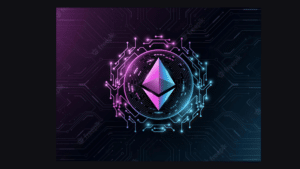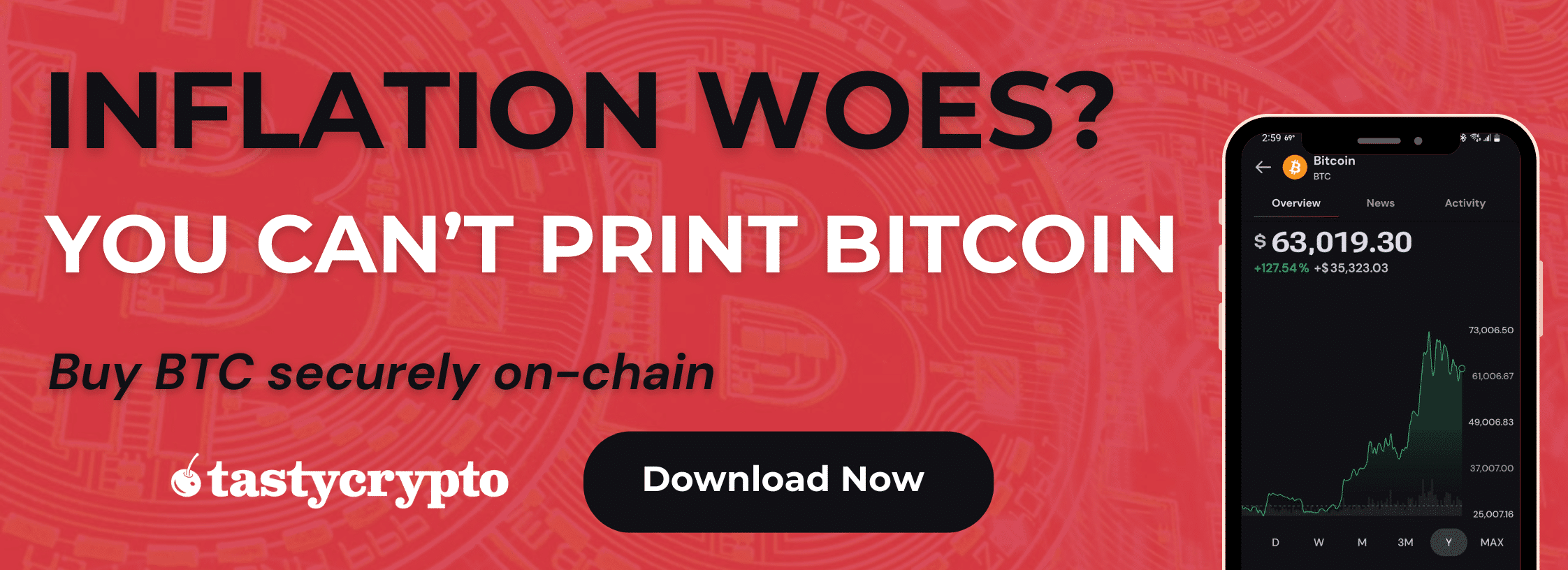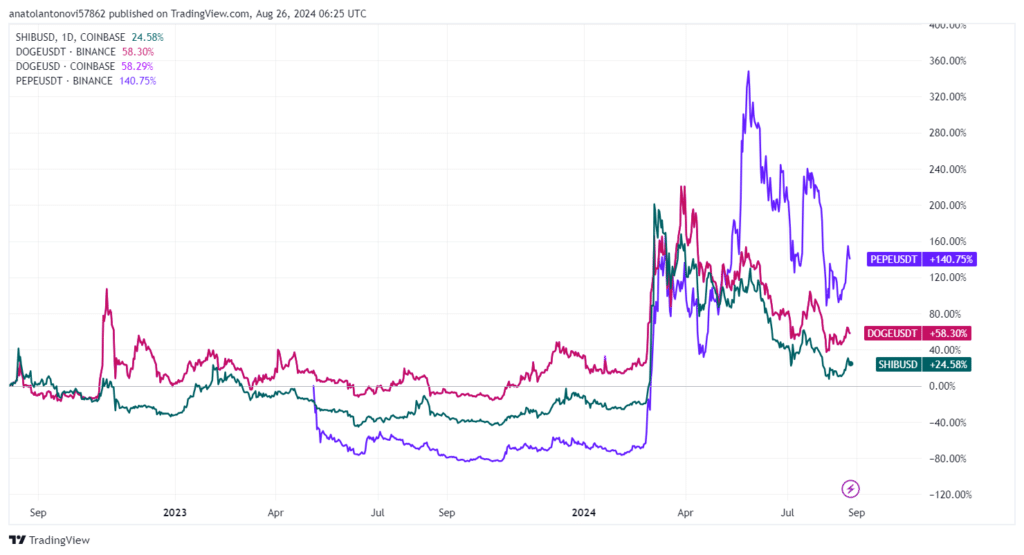Dogecoin is the original meme coin and holds a dominant position bolstered by high-profile endorsements and a large market cap. Shiba Inu (SHIB) stands out by leveraging Ethereum’s infrastructure to foster a DeFi ecosystem. Pepe Coin (PEPE), the newcomer, is quickly gaining traction due to its meme inspiration.
Written by: Anatol Antonovici | Updated August 5, 2024
Reviewed by: Mike Martin
Fact checked by: Ryan Grace

When compared to Shiba Inu (SHIB) and Pepe Coin (PEPE), Dogecoin (DOGE) dominates the meme coin space and remains the best option so far.
Table of Contents
🍒 tasty takeaways
- Dogecoin, the original meme coin from 2013, leads in market cap and recognition.
- Shiba Inu, launched in 2020, builds on Ethereum’s DeFi ecosystem and offers an array of Web3 applications.
- Pepe Coin, the newest contender from 2023, also operates on Ethereum, leveraging the popular Pepe the Frog meme for attention.
- While Dogecoin boasts celebrity endorsements like Elon Musk, Shiba Inu’s ecosystem includes DeFi tools like ShibSwap
- Both Dogecoin and Shiba Inu dominate in popularity, but the meme coin landscape remains unpredictable.
| Attribute | Dogecoin (DOGE) | Shiba Inu (SHIB) | Pepe Coin (PEPE) |
|---|---|---|---|
| Year of Creation | 2013 | 2020 | 2023 |
| Market Cap | $13.2 billion | $5.4 billion | $658 million |
| Twitter Followers | 3.8 million | 3.7 million | 500k |
| Blockchain/Token Type | Native | ERC-20 on Ethereum | ERC-20 on Ethereum |
| Key Highlights | Elon Musk's support | DeFi ecosystem, staking, NFT incubator | No-tax policy, deflationary model |
| Token/ Coin Supply | 140 billion | 590 trillion | Not specified |
| Special Facts | DOGE is like the Bitcoin of meme coins. | Half supply sent to Vitalik Buterin; 400 trillion burned. | Reached $1.6 billion valuation soon after launch. |
What Are Meme Coins?
Meme coins are cryptocurrencies based on viral memes, often starting as jokes without specific utility. Their value is driven by blockchain tech and demand, with popularity surging from social media buzz. Relying on community support over utility makes meme coins especially volatile in the crypto world.
Some meme coins have become multibillion-dollar markets. For example, Dogecoin (DOGE) – the most popular of them all – is the 8th largest cryptocurrency, having a market cap of $16 billion as of mid-August 2024. To put it into perspective, it’s a bigger market cap than the native coins of Tron, Polygon, Polkadot, Avalanche, Chainlink, or Stellar, all of which try to bring innovation and address some challenges.
Dogecoin initiated the meme coin trend in late 2013 when two software engineers from IBM and Adobe humorously spoofed Bitcoin (BTC). Nevertheless, the coin could consolidate the subsequent hype since its underlying blockchain technology is genuine.
What Is Shiba Inu (SHIB)?
Shiba Inu (SHIB) is a meme coin that was launched in 2020. Its main goal is to act as a DOGE alternative for the Ethereum (ETH) ecosystem. Therefore, SHIB operates as an ERC-20 token on Ethereum and doesn’t possess a native chain.
Leveraging Ethereum’s smart contract feature, SHIB has been developing an entire ecosystem of Web3 applications to contribute to the decentralized finance (DeFi) revolution.
This ecosystem includes a decentralized exchange (DEX) called ShibSwap and an artist incubator for non-fungible token (NFT) creators. SHIB holders can stake the coin on this native DEX and receive BONE tokens as rewards. BONE holders are allowed to participate in governance. Shiba Inu also has a layer 2 solution called Shibarium.
SHIB has a circulating supply of almost 590 trillion tokens. With a market capitalization of over $8.8 billion, SHIB is in the top 20 largest cryptocurrencies.
SHIB Interesting Facts
- SHIB was created by a pseudonymous entity known as Ryoshi, who claimed that “I am nobody. I am not important.”
- Following the launch, half of the circulating supply was locked to Uniswap, a DEX, while the other half was sent to Ethereum co-founder Vitalik Buterin, which raised eyebrows in the crypto community. Eventually, Buterin sent over 50 trillion SHIB (over $1 billion) to the India Covid Relief Fund and burned over 400 trillion SHIB (over $6.5 billion), or 40% of the total supply.
What is Dogecoin (DOGE)?
Dogecoin (DOGE) is the original meme coin. Dogecoin was created in 2013 by software engineers Billy Markus and Jackson Palmer. The coin was inspired by the ‘Doge’ meme – a fun picture of a Shiba Inu dog.
While the coin and its underlying blockchain were meant to be a lighter and funnier version of the serious Bitcoin project, DOGE itself has exploded in popularity beyond any expectations.
The underlying technology of Dogecoin comes from earlier cryptocurrencies like Luckycoin and Litecoin, the latter being a fork of Bitcoin. Like Bitcoin, Dogecoin relies on a Proof of Work (PoW) algorithm, but DOGE is much easier to mine than BTC.
Unlike Bitcoin, Dogecoin operates without a deflationary model and possesses an unlimited supply, a choice designed to promote continuous circulation.
DOGE’s circulating supply is currently over 145.6 billion tokens and has a market cap of $15.8 billion in August of 2024.
DOGE Interesting Facts
- DOGE has been consistently praised by Tesla and SpaceX CEO Elon Musk. Every time Musk tweets or says something about DOGE, its price goes wild. The world’s richest person believes that DOGE is better than Bitcoin due to its price accessibility and higher transaction volume capability.
- Dogecoin has 3.9 million followers on Twitter, more than the Ethereum Foundation, Solana, or Cardano.
What is Pepe (PEPE)?
Inspired by the Pepe the Frog meme, Pepe Coin (PEPE) is the latest meme coin. PEPE is an ERC-20 token on Ethereum.
Pepe was launched in 2023 and has a market cap of $3.7 billion. The Pepe project aims to capitalize on meme coin giants like DOGE and SHIB, offering some features and incentives to attract users, such as a no-tax policy, a deflationary model, and rewards for long-term stakers. No one knows who created PEPE, but the token gained attention thanks to the popularity of the meme itself.
PEPE stunned markets in May of 2023 when its valuation soared to over $1.6 billion, largely propelled by its listing on leading crypto exchanges. Its current $3.7 billion market cap remains notable for a token that began as a joke.
Shiba Inu vs. Dogecoin vs. Pepe: What Is Best?
Here is a brief comparison of the three meme coins:
Here is the performance of the three coins over the last two years:
Source: TradingView
So which one is best? Given that meme coins have no real utility, you can choose any of these three to invest for fun. Maybe you like the Shina Inu meme or Pepe the Frog meme. It’s advised to limit exposure to meme coins because of their high volatility.
Since PEPE is a relatively new token, DOGE and SHIB remain the best meme coins on the market. DOGE is like the Bitcoin of meme coins, and it’s praised by Elon Musk himself, while SHIB has an entire DeFi ecosystem around it.
Secure Your Memecoins With Self-Custody
🔒 Take full control of your digital assets with a self-custody wallet. Unlike relying on large exchanges, where your crypto’s fate is in their hands, a self-custody wallet ensures you’re the sole guardian of your crypto. Secure your crypto future—download the tastycrypto wallet today. 👇
FAQs
The main difference between the two is that Dogecoin has a native blockchain while SHIB leverages the Ethereum infrastructure. DOGE relies on a PoW algorithm that supports mining.
Dogecoin remains the leading meme coin, boasting over 3.8 million Twitter followers. SHIB follows closely with 3.7 million, and PEPE trails with 500k.
DOGE is the oldest meme coin in the crypto market and it has been backed by many famous people, including Elon Musk, Snoop Dog, and Mark Cuban. It’s hard to see a Dogecoin killer anytime soon, but the meme coin space is quite unpredictable.

Anatol Antonovici
6+ years of experience writing for crypto brands and blockchain firms, including Coindesk, Cointelegraph, Bitcoinist, CryptoPotato, Algorand, and OTCTrade.com


The Core Blockchain and DeFi Ecosystem: What You Need to Know

7 Best DePIN Crypto Projects

What Is Symbiotic and How Does It Work in 2024?

Ethereum vs Ethereum ETFs – 5 Major Differences







